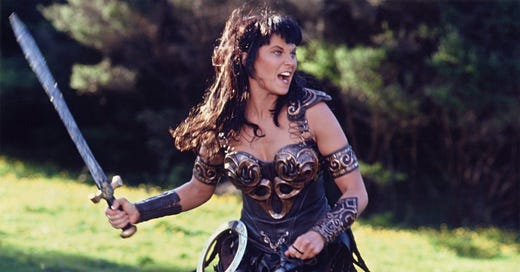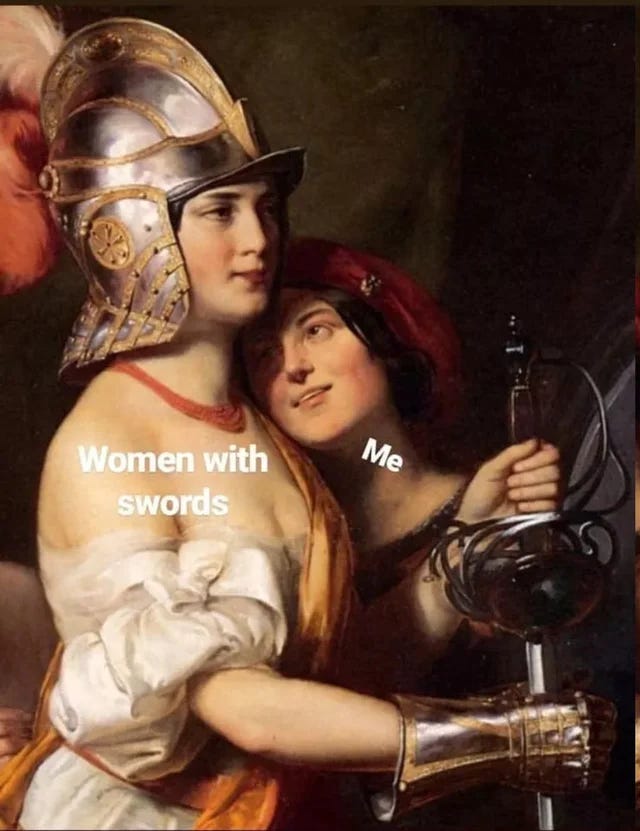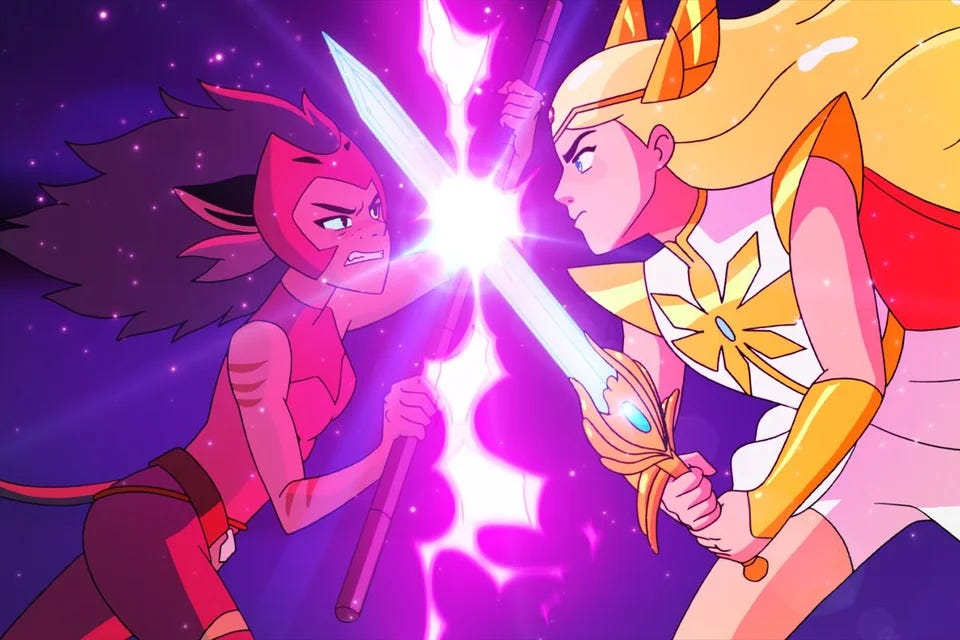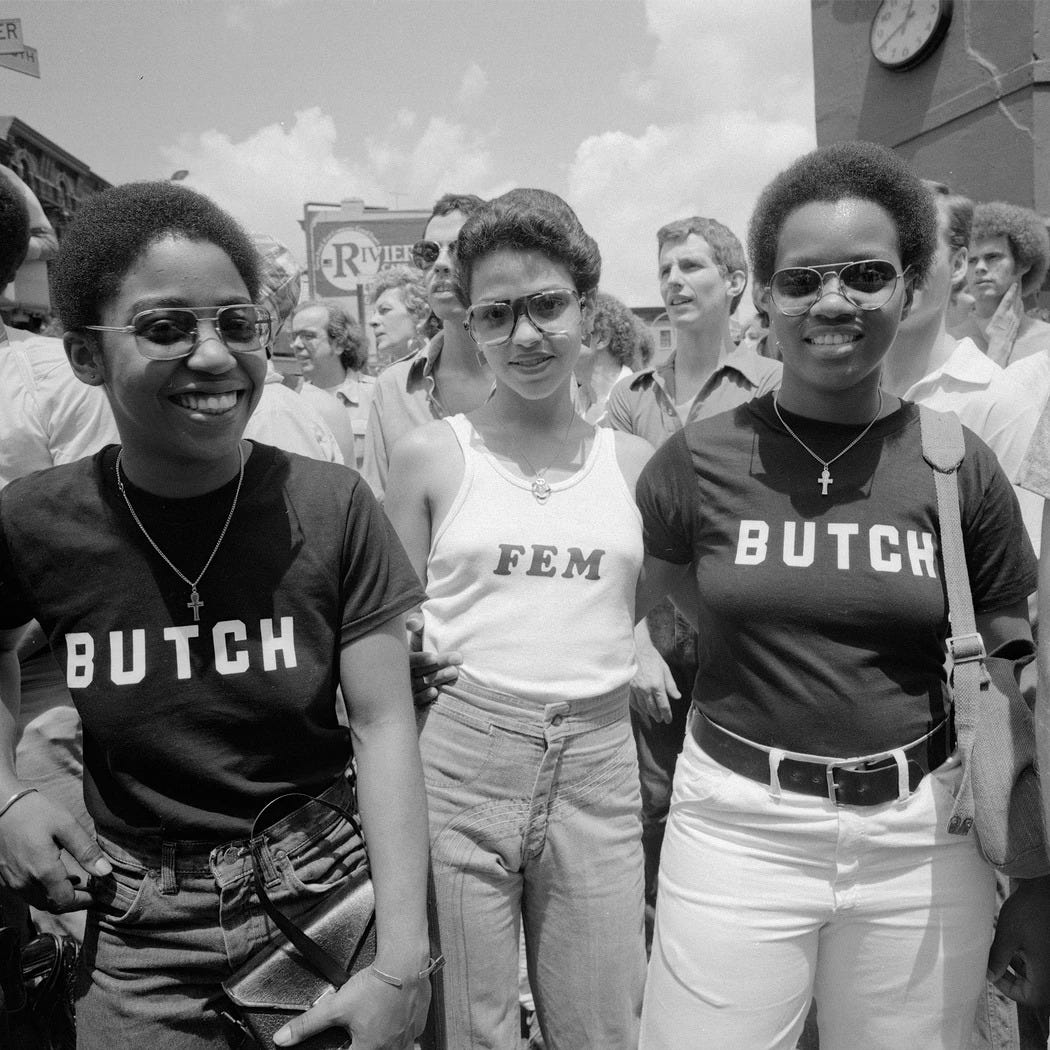On Sword Lesbians
Or, “Can someone please explain the sword lesbian thing to me? I’m a lesbian, I don’t have a sword? Should I get a sword?"
This is the Sunday edition of Paging Dr. Lesbian. Plus, this week’s dispatch from the lesbian internet. If you like this type of thing, subscribe!
While writing my piece about Rachel Weisz from several weeks ago, I briefly touched upon “sword lesbians” while discussing the famous bikini-clad sword-fighting scene from The Mummy Returns. Upon further consideration, I realized that it is very likely many of you are unfamiliar with the idea of sword lesbians and I decided it would be a fruitful topic of analysis – so here we are.
Admittedly, sword lesbians is not a particularly complex idea to define. To put it simply, the term encompasses sapphics who are in some capacity interested in swords and other similar weapons – either owning or wielding them themselves, or, as an addendum, admiring other women or non-binary folks who use them. While this term has been around for a number of years now, I’ve noticed a resurgence lately, most notably with the release of an RPG game called Thirsty Sword Lesbians earlier this month. I think there is something interesting to consider here – how did this term come about? What draws people to the idea? Why swords?
Because this is a term that largely originates and is used online, I took to the internet to crowdsource some ideas about how this idea functions within the queer community. Through my research, I found an entire subreddit1 dedicated to sword lesbians, as well as various discussions about it on other popular lesbian subreddits. When I asked the sapphics of Reddit what they thought about sword lesbians – in addition to combing through some previous threads about the topic – I found some very insightful responses.
One theory about the popularity of sword lesbians centers on their historical significance. As I’ve spoken about before, lesbians and queer people often have a particular interest in excavating history; unearthing stories of iconic figures who might contemporarily be considered queer. As several users on Reddit suggested, this idea of sword lesbians is perhaps connected to this desire for historical connection. I also found several references to Joan of Arc – armor-wearing, sword-wielding saint – who has long been considered a queer/androgynous/butch icon among various generations of sapphics. One user was particularly eloquent in their delineation of this theory.
I have this theory that part of the sword lesbian trope is the result of historical lesbians either being invisible to history, like two spinsters sharing a home a cat and maybe one of their sister's orphaned daughters to raise, or they did a thing that commanded the respect of men, like join the military or become pirates, that allowed them to act as men without much pushback and be recorded in history. So basically i think there's like this gnc/lesbian survivorship bias for female historical figure
In a similar vein, one of the most beloved lesbian shows of all time is Xena: Warrior Princess, which takes place in ancient times and features Xena (and Gabrielle) wielding many sword-like weapons during the series. (I would perhaps include Buffy in this conversation as well, although Buffy’s weapon of choice is primarily a stake, though she does at one point wield a particularly impressive scythe). Xena in particular is an important show for Millennial and Gen X sapphics, which seems – in my estimation – to fit in with the generations that are most invested in this sword lesbian concept. That is, sword lesbians do not seem to be as popular with the Gen Z set, and though it is primarily a digital phenomenon (at least as conversations about it are concerned), its roots seem more ancient – if you will – than some of the more recent queer ideas that have emerged on places like TikTok.
There are several other media objects that also might help explain this interest in sword lesbians. For example, I might place Angelina Jolie’s Lara Croft: Tomb Raider here (although she primarily uses guns in the film), as well as The Mummy series, which I mentioned above. (The sword-fighting scene in The Mummy Returns was truly a cultural reset). Indeed, both these films deal primarily with ancient artifacts and cultures and star women who are considered lesbian or queer icons by many. Certainly, there is also a connection between sapphics and action movies more broadly, as these films – when they do actually feature women – often depict badass, weapon-wielding women who frequently flout gender roles in some way. Not to mention that these women are – to put it plainly – very hot. Though the aforementioned films are two decades old at this point, they continue to circulate as important artifacts and cultural touchstones within the sapphic pop culture universe.
The intertwined functions of gender and desire are also central components in the world of sword lesbians. Sword lesbians seem to also represent a particular desire for butchness – an identity that has long been erased and/or maligned – as these images almost always suggest, at the very least, an androgynous gender presentation. As several users on Reddit noted, a woman who wields a sword is immediately marked as transgressive, and this refusal to abide by normative gender roles is in and of itself very queer. Whether someone desires to inhabit the aura of a sword lesbian themselves or is attracted to the sword lesbian image, both desire and gender play are clearly present here. Two Reddit users put it this way:
In my own limited experience sword lesbians are to renaissance fairs/being Tom-boys, as lipstick lesbians are to femininity. I think it can be broken down into memin’ categories;
A. Has idolized Jean d’Arc at some point
B. Probably owns a least one bladed weapon or at least has a Pinterest of good ideas
C. Does not mind at all to be the Tom-boy who inspires “omg she is so beautiful” when she takes her helmet off
I think part of the reason the concept exists is that for a long time sword-wielding female characters were the closest thing we got to butch representation, and probably still make up the majority of non-villain butch-type characters young adults are exposed to. I think the sword kind of symbolizes the feeling we got when we saw our first taste of women bucking gender norms and slicing apart their oppressors.
It certainly seems like the sword lesbian attitude is thus as important as their style or aesthetic. As one user noted: “Women in powerful positions (those who know how to wield swords are fighters and are strong) that defy the heteropatriarcchy’s submissive role for women makes them “queer” in the sense that they don’t adhere to normal standards for women.” Another Reddit user pointed out that the antiquated nature of swords harkens back to a time when “chivalry, honor, and skill” were highly regarded qualities. This chivalry – which is perhaps intertwined with visions of a playfully antiquated power dynamic – is a quality that has been taken up by some sapphics in perhaps a less traditional form. As this same Reddit user noted, “Its representation for us in the same vein as the "knight in shining armor" idea is for straight women.”
While I’ve seen it said that “lesbians have swords and bisexuals have archery,” these distinctions are obviously not meant to be exclusive. (As a side note about archery, you may recall when this queer archer on Tik Tok set the internet aflame a couple of months ago). Several years ago a wedding photo depicting two brides with swords went viral on Twitter. The two women in question run a Twitter account called “Bisexuals of the Blade,” where they describe themselves as “The bisexual sword wives.” Certainly, queerly-associated activities such as sword-fighting and archery can be enjoyed by sapphics of all stripes, labels notwithstanding. As the bio for the Sword Lesbians subreddit reads: “This is a subreddit for lesbians, bisexuals, pans, aces and all lovely wlw [women who love women] with an interesting, albeit slightly frightening to others, fascination with swords and other weapons.”
To be sure, sword lesbians is a very niche concept that is by no means representative of the interests of all (or most) lesbians and sapphics. As someone noted in the comments of a confused Redditor’s post who was wondering if they needed to go out and buy a sword: “I don’t care about swords. I am friends with lots of lesbians that don’t care about swords. The only lesbians that care about swords are on this subreddit. You’re fine.” Obviously, much of this discussion is in jest, though if you go on r/swordlesbians you will find actual lesbians with an impressive set of swords and/or knives. Whether it’s an ancient tradition or simply an incessant meme, sword lesbians are not to be trifled with.
A special thanks to the lesbians of Reddit who answered my questions or otherwise contributed to the sword lesbian discourse.
Welcome to this week’s dispatch from the lesbian internet.
A lot has happened this week, so buckle up! Firstly, it has been brought to my attention that Game of Thrones star Sophie Turner potentially (probably) came out as bi at the beginning of pride month. The Instagram story she posted earlier in the month is pretty clear evidence.
In other celesbian/celebisexual(?) news this week, Orange is the New Black star Taryn Manning (who famously played an unhinged homophobe on the show) announced her engagement with her girlfriend earlier in the week. Mazel tov! Even more exciting is that there has been another sighting of Janelle Monáe and Lupita Nyong'o, who were rumored to be an item after this legendary photo of Monáe, Nyong’o and Danai Gurira surfaced in May of 2019. We literally love to see it.

For Pride Month, here are two Letterboxd-curated lists suggesting movies to watch this month. They both feature underseen or undervalued films that deserve reconsideration this June, particularly considering recent conversations about the corporatization of Pride.
Unfortunately, it has been brought to my attention that there was a recent controversy surrounding Billie Eilish that I feel compelled to comment on. Earlier this month Eilish released a video for her new song Lost Cause, which features her and several (somewhat scantily-clad) women dancing together at what appears to be a sleepover-like gathering. The vaguely sapphic nature of the video aside, Eilish then posted several screenshots from the video on Instagram with the caption “i love girls.” This sent some fans into a frenzy, several of whom had already criticized the video itself for being an example of “queerbaiting.” (There was also some controversy about her current boyfriend that I can’t get into here). The Twitter discourse quickly gained steam, with the hashtag #youlikegirls (in reference to her Instagram caption) becoming a trending topic on Sunday night. Frankly, I think the main issue here is that many of the people involved in this discussion have no idea what queerbaiting really means or what the history of the term is. Firstly, queerbaiting is primarily used to describe a corporate strategy to engage queer audiences without actually producing canonically queer content. It is mostly used to describe fiction. It is not meant to describe how an individual does or does not exhibit their sexuality in public. While lesbianism has certainly been commodified in pop music in the past – most notably (and painfully) with the Russian band t.A.T.u. pulling a lesbian stunt in the early 2000s and then turning out to be homophobic – I would argue moments like that fall more along the lines of fetishization. Regardless, it’s disheartening to see a useful theoretical idea being boiled down to personal identification – which in turn forces (young) celebs like Eilish to explicitly define their sexuality one way or the other.

In TV/movie news, the trailer for Season 4 of Atypical – which drops on July 9 – was released this week. This is important for us because Atypical features the adorable lesbian couple #Cazzie, which captured the hearts of the nation when they first got together several years ago. Secondly, criminally underrated actor and star of the queer cult-classic Jennifer’s Body Megan Fox stars in a new thriller called Till Death, which comes out on July 2nd. Watch the trailer here.
In other news, Megan Rapinoe was named a Victoria’s Secret Ambassador as part of what the New York Times calls “the most extreme brand turnaround in recent memory.” The Victoria’s Secret Fashion show is out, gay soccer players are in.
Lastly, if you need something to read this week, check out this incredible New Yorker piece from last summer, What Have We Done To The Whale? and this insightful piece from Verso Books, Defund Is A Strategy.
That’s all for this week, folks! Tune back in next time. In celebration of Pride Month, I will leave you with this photo from New York City Pride in 1977, taken by Meryl Meisler.
If you didn’t know, Reddit is a social media site modeled after old-school web forums. Essentially, the site aggregates thousands of individual forums (known as subreddits) that users can post in, comment on, and follow. Users can post links, images (frequently memes), or discussion prompts in each subreddit. Subreddits can be very broad, such as r/lgbtq, or very niche, such as r/swordlesbians.











